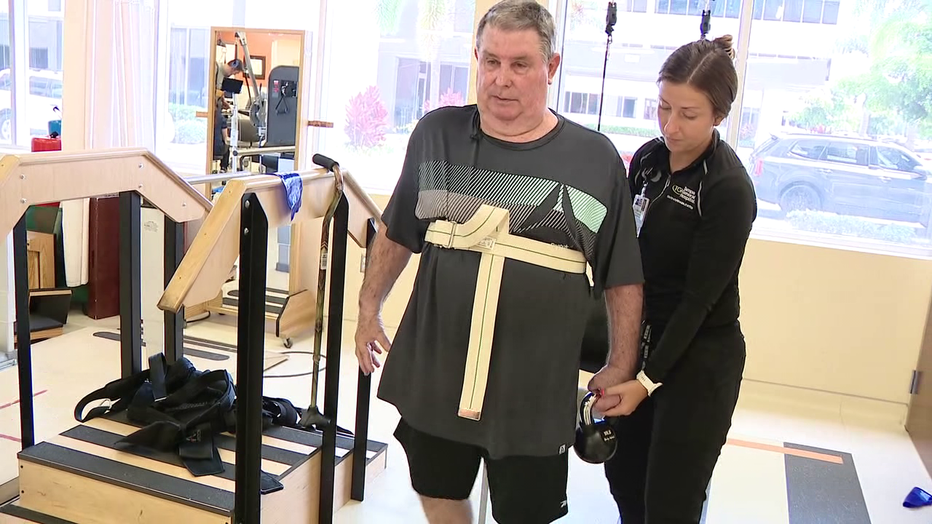I can't say I would want to go to this hospital. 'Improve' is NOT GOOD ENOUGH! The term should be delivering stroke patient recovery! Words matter!
I think most stroke survivors would rather do the non-invasive approaches. So ask your doctor why surgery; I'm guessing revenue and profits.
Dorset Embarks on Revolutionary Stroke Recovery Trial Utilizing Earpiece Technology
Non-invasive VNS approach could enhance post-stroke recovery outcomes August 2023
The latest here:
Tampa General Hospital introduces device aimed at improving stroke patient recovery
TAMPA, Fla. - A man in the Tampa Bay area is the first patient at Tampa General Hospital to receive a device to help improve his recovery after suffering a stroke.
Randy Jackson suffered a stroke in February 2023, and he lost mobility on his left side, and has been in rehabilitation to regain mobility and function ever since.
"I went to bed at 7," Jackson said. "At 7:30, I got woken up, and I was so dizzy that I couldn't even sit up in the bed. And then, I noticed that my arm and my face were numb, so I said, ‘Oh, I'm having a stroke.’"
READ: Bay Area hospital using AI technology for new cardiac procedure
Jackson said he was in the ICU for a couple of days, then remained in the hospital for several more days. He said he got a glimmer of hope while he was at the hospital.
"I'm like, ‘Oh my God, I'm moving my finger,'" he said. "So I call the nurse. ‘Look, my finger is moving’. She went and got somebody else. ‘Oh my God, his finger is swollen.' So I had my whole room saying, ‘Oh my God, he's moving his finger’. So I knew since that day, I would make it."
Jackson said he’s undergone physical therapy and occupational therapy multiple times a week for around 13 months. When his progress started to slow down, though, doctors had a new idea to help improve his progress.
"This is an intervention for patients, really, who didn't have an intervention like this in the past," Dr. Yarema Bezchlibnyk, the associate professor of neurosurgery at the University of South Florida and surgical director of TGH’s Epilepsy Movement Disorders, Neuromodulation and Peripheral Nerve Reanimation Centers.
MORE: Bay Area hospital using AI technology for new cardiac procedure
Bezchlibnyk introduced Jackson to the Vivistim device. He said it’s a pacemaker-type device that connects to a nerve in the neck, which helps the brain communicate with the nervous system.
"So the idea here, we think, is that it promotes other parts of the brain to sort of fill in the gap, so to speak, and potentially develop new connections in that area that's been damaged," Bezchlibnyk said.
Jackson is the first patient at TGH to get the Vivistim device implanted, and had the procedure in December.
Typically, Bezchlibnyk said treatment for patients consists of intense rehabilitation. Instead of rehabilitation on its own, the Vivistim device works with Jackson when he’s doing physical therapy to speed up his rate of improvement.
"You take a magnet, you swipe it over the stem, and it turns on for 30 minutes," Jackson said.
READ: Tampa General Hospital breaks ground on new surgical tower: 'Hard to put into words'
His main goal is to continue regaining mobility to be able to do everyday things on his own again.
"I'd say I'm like 50%. So I'm looking for 80 or 90. I don't have to have 100," Jackson said.
One of his long term goals, is to hopefully be able to play pickleball again in some capacity.

"Even if I could just hit the ball over the net, that would be good for me, because I don't know if I'm ever going to be able to get back to where I was, but I'm glad I'm alive," Jackson said.
Bezchlibnyk said Jackson has had a striking response to the device.
He said the device is beneficial to patients regardless of how far out their stroke was, and the device has proven to help the rate of improvement for patients.
MORE: Florida Center for Nursing starts pilot program aimed at combating burnout
"Roughly 73% of patients at one year see benefit, and then that number gets better over time," Bezchlibnyk said.
The American Stroke Association said stroke is the fifth leading cause of death and the leading cause of disability in the U.S.
No comments:
Post a Comment